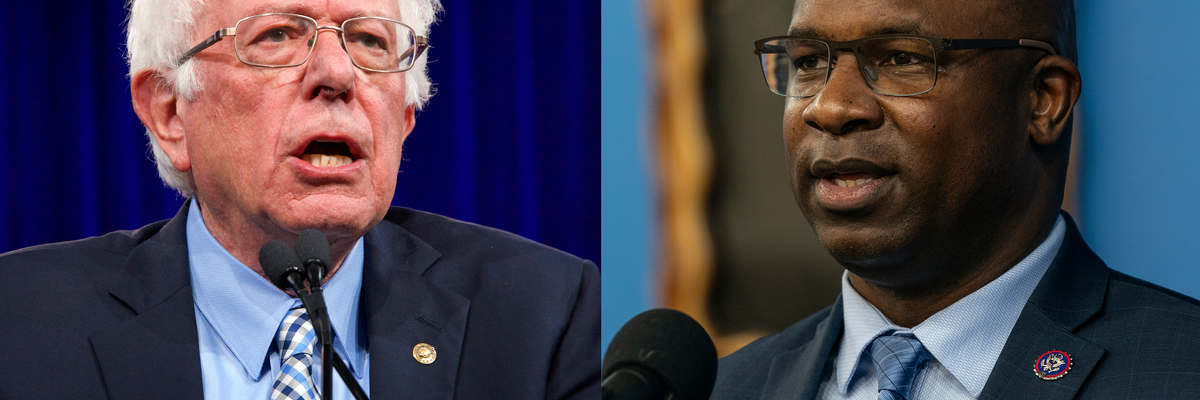Rep. Jamaal Bowman (D-N.Y.) and Sen. Bernie Sanders (I-Vt.) are leading an effort to push the Biden administration to investigate whether U.S. arms sales to Israel are being used to commit human rights abuses in violation of U.S. law, Jewish Currents first reported.
In a letter to President Biden and Secretary of State Antony Blinken, Bowman, Sanders and a handful of other House members — including Reps. Alexandria Ocasio Cortez (D-N.Y.), Ilhan Omar (D-Minn.), and Betty McCollum (D-Minn.) — cited “the rapidly escalating violence in the occupied Palestinian West Bank and the alarming actions of the new extreme right-wing Israeli government” as a catalyst for the investigation “to prevent the further loss of Israeli and Palestinian lives.”
The letter refers to many instances of violence over the past several weeks that have killed both Israelis and Palestinians and that their concern about the “Israeli government’s worsening systemic violations of Palestinian human rights … have only deepened and grown more urgent under the new Israeli government.”
The letter calls on the administration to ensure that the United States is not underwriting illegal settlements and to determine whether U.S. arms sales to Israel are being used to violate American law (i.e. the so-called “Leahy Laws”) or commit human rights abuses.
“Furthermore,” the letter concludes, “we call on your administration to ensure that all future foreign assistance to Israel, including weapons and equipment, is not used in support of gross violations of human rights, including by strengthening end-use monitoring and financial tracking.”
For FY2023, Congress appropriated $3.8 billion in aid to Israel for defense, and nearly another $100 million “in funding for other cooperative defense and non-defense programs.”
“It's long past time for the Biden administration to take a hard look at the use of U.S.-supplied weapons in ongoing human rights abuses committed by the Israeli military, and to impose consequences for those abuses,” said the Quincy Institute’s Bill Hartung. “More members of Congress need to join Rep. Bowman and Sen. Sanders in calling for accountability over the billions in annual U.S. military aid to Israel.”
Jewish Currents adds that nearly two dozen non-governmental organizations have offered support for the letter, but that prominent left-leaning pro-Israel group J Street has not yet to publicly support it.
“This letter is a welcome step forward, reflecting not only a reaction to the naked extremism of Israel’s new government but also broadly the political space created by expanding support for Palestinian rights among American voters,” said Sarah Leah Whitson, executive director of Democracy for the Arab World Now, who charged that giving weapons to Israel “violates U.S. laws prohibiting arms transfers to human rights abusers and undermines our global interests as well.”
- Biden readying emergency weapons aid for Israel - Responsible Statecraft ›
- Sen. Sanders calls for probe into Israeli human rights violations - Responsible Statecraft ›
- Biden says he's pushing a 2-state solution. Let's put him to the test. | Responsible Statecraft ›
- Biden OKs more arms to Israel, crushing hope of Gaza shift | Responsible Statecraft ›
- Bowman loses to GOP-fueled AIPAC cash | Responsible Statecraft ›
















